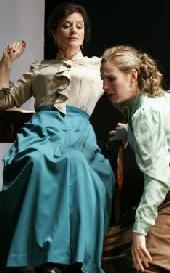SEARCH
REVIEWS
FEATURES
NEWS
Etcetera and
Short Term Listings
LISTINGS
Broadway
Off-Broadway
BOOKS and CDs
OTHER PLACES
Berkshires
London
LA/San Diego
Philadelphia
Elsewhere
QUOTES
On TKTS
LETTERS TO EDITOR
FILM
LINKS
MISCELLANEOUS
Free Updates
Masthead
Writing for us
A CurtainUp  London Review
London Review
 London Review
London ReviewYou Never Can Tell
by Brian Clover
|
Women must shed the false manners of their slavery before they can show the true manners of their freedom.
---- Mrs Clandon |

Diana Quick as Mrs Clandon and Nancy Carroll as Gloria
(Photo: Nobby Clark) |
No, and soon trouble is brewing. Reared on advanced principles, the two younger people immediately make waves in the parlours of this stuffy sleepy seaside town. They are too brightly-dressed, too cheerful and too cheeky to pass for respectable English. Older sister Gloria will stand no nonsense from young bachelors, an equally deplorable trait. The young Clandons walk bare-foot on the beach. They drink lager. Dolly even smokes. These failings might be forgiven, they are told by dentist Valentine (Ryan Kiggell), but what cannot is the absence of a father. Without a paterfamilias to their name they are doomed to be social pariahs. Mrs Clandon herself is darkly secretive about her husband. So why did they split up and… who is he?
Well, when you realise that her ex, Mr Crampton (Ken Bones), not only lives in this very same town, but has accidentally been invited to dinner some twenty minutes into the play, you might feel that Shaw is straining coincidence a little too far. One of the family says as much. However contrived, the surprise meeting between the violent, narrow-minded father and his free-spirited offspring has much dramatic potential. Sadly Shaw, though a master dramatist doesn't quite seem to know what to make of his material. This comprises a number of strong themes: divorce, domestic violence, adultery, bigotry, and the tyranny of patriarchy. But Shaw eschews a darker treatment in favour of bantering farce, as if Noel Coward had re-written Ibsen, and so the play chugs along amiably without ever quite taking off.
Presumably You Never Can Tell has been revived as a vehicle for the much-admired stars Diana Quick and Edward Fox (William the waiter). But sadly these two have too little to do, although they do it very well: Mrs Clandon's work has been done before the play starts and she recedes into the background for most of the action. William drily comments on, as well as discreetly fixing, some of what follows and may have helped inspire P G Wodehouse's Jeeves. Most of the work is done by the rest of the cast and they do it superbly, as you should expect from a Peter Hall production. Ryan Kiggell excels as the candidly calculating Valentine who expertly conquers Gloria only to find that he is her captive. Sinéad Matthews is delightful as Dolly, deploying a sensuous throaty throb worthy of Joan Greenwood in Kind Hearts and Coronets. Michael Mears's brilliant barrister Bohun steals his scene, as he is meant to.
While You Never Can Tell fizzes and pops in places and there are a few good lines, there are more dull ones and slack patches, particularly the dinner scene where the food serving business is mildly distracting. While acting of this calibre is always worth seeing, time has not been kind to the play itself, which has lost much of the shock value it must have enjoyed in 1896. A woman in a dentist's chair without a chaperone present (though fans of Seinfeld know what this can lead to); a barefoot woman carrying her stockings; an on-stage kiss between an unmarried couple; the son of a waiter ordering the affairs of his social superiors; adolescents openly mocking their father; a family row in front of the staff: these do not scandalise us. However, what did shock me -- though perhaps Shaw wouldn't have expected it to - was the sight of the servant treating his son, whose abilities have raised him to the rank of gentleman, as he would any other social superior, bowing to him and calling him "sir", a deference casually accepted and enjoyed by the ungrateful skunk. But then he is a lawyer . . . .
Editor's Note: For links to more about Shaw and plays by him reviewed at CurtainUp (including two other productions of You Never Can Tell), see our Shaw Backgrounder.
| YOU NEVER CAN TELL
Written by George Bernard Shaw Directed by Peter Hall Starring: Diana Quick, Edward Fox With: Ken Bones, Nancy Carroll, William Chubb, Matthew Dunphy, Madeleine Hitchins, Ryan Kiggell, Sinéad Matthews, Michael Mears Design: Kevin Rigdon Lighting: Paul Mumford Sound: Gregory Clarke Running time: Two hours forty minutes with one interval A Theatre Royal Bath Production Box Office: 0870 890 1104 Booking 11th March 2006 Reviewed by Brian Clover based on 7th November 2005 at the GarrickTheatre, Charing Cross Road London WC2 (Rail/Tube: Charing Cross) |





